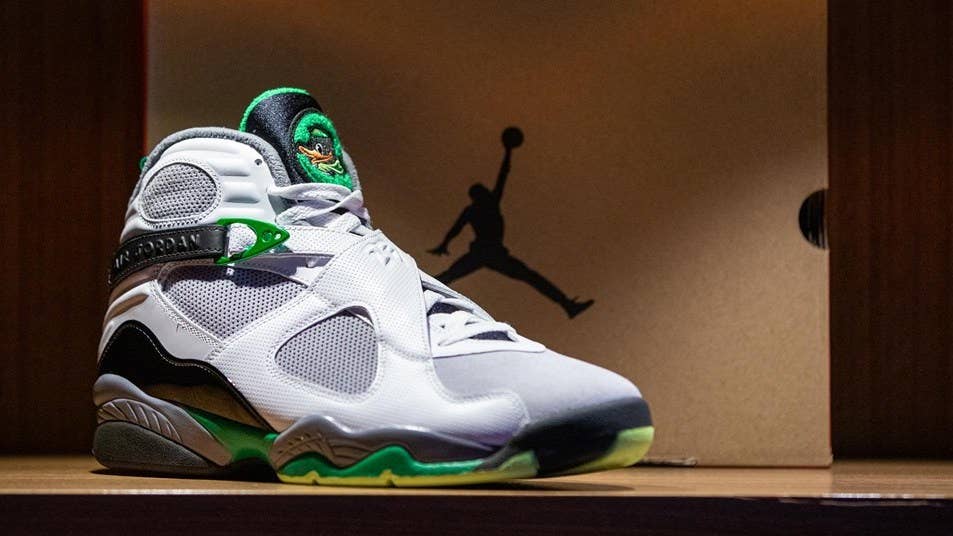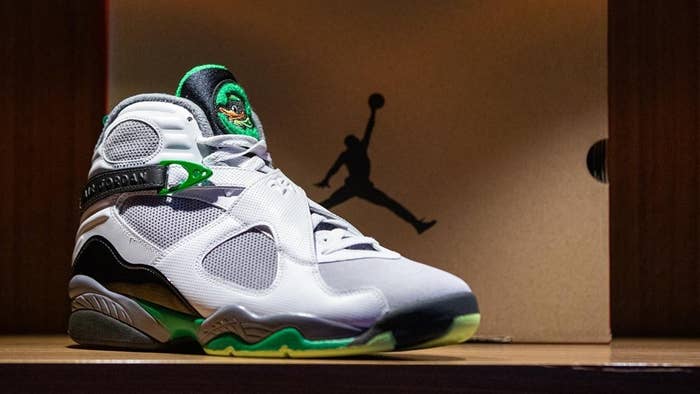
For the first time ever, student athletes at the University of Oregon will be allowed to turn the cultural cachet of their exclusive sneakers into actual currency. This week, 100 pairs of the new Oregon Ducks version of the Air Jordan 8 tied to the school’s football team went up for auction. All of the money raised from the sales will go directly back to players on the team, who will split the proceeds evenly. This type of sale has historically been forbidden, but an overhaul of the rules prohibiting college athletes to profit off their name, image, and likeness earlier this year has opened up new avenues for NCAA athletes to make money.
The auctions are facilitated by sneaker resale platform StockX in partnership with Division Street, an agency established this year to work with Oregon student athletes on NIL deals. The company was started by powerful Oregon alumni and donors, including Nike co-founder Phil Knight, and is staffed at the top level by ex Nike execs. Nike’s roots can be traced back to Oregon athletics, and the school has long enjoyed the benefit of that connection through sizable donations and flashy gear.
Sabrina Ionescu, the star point guard who shattered records on the Oregon women’s basketball team before starting her WNBA career with the New York Liberty in 2020, is Division Street’s chief athlete officer.
“Division Street continues to demonstrate thinking outside the box for our Oregon athletes and partnering with innovative companies,” Ionescu said via email. “With former Nike execs and Phil Knight leading the charge for Division Street, we loved the idea of dropping select pairs of the Oregon Jordans in an unexpected way that would benefit our athletes.”
The pairs of Air Jordans in question are dressed in white, black, and green with the school’s fighting duck logo on the tongue in black, as a nod to the Black student athletes that make up Oregon’s teams. The football players will get their personal pairs, but an extra 100 were set aside for the auction. The StockX release, sizes for which range from men’s 6 to 17, started on Monday at noon and concludes on Wednesday a minute before noon.
The coveted versions of player edition sneakers like those made for the college athletes at Oregon inevitably make their way to secondary markets, where they sell for thousands of dollars. But selling them to benefit the students they’re made for in this way is unprecedented.
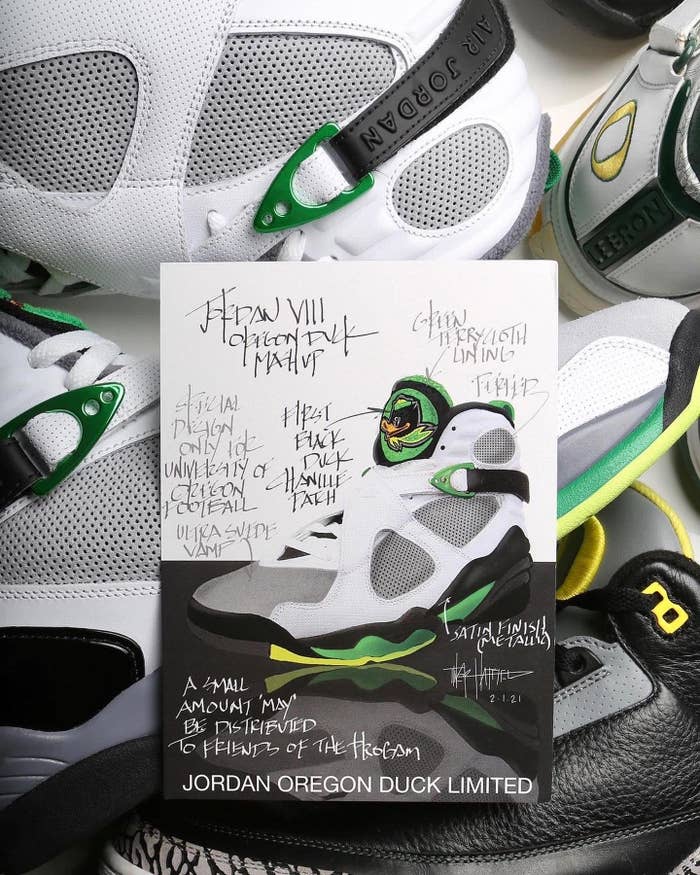
It’s important to note that Nike is not directly involved in the sale of the shoes, although it did announce its first NIL deal with a student athlete on Tuesday. Nor is the University of Oregon, which is still not allowed to compensate student athletes. The school’s explanation of NCAA rules make it sound like student athletes are still not able to sell their own shoes themselves either—bylaw 16.11.2.4 states that “an item received for participation in intercollegiate athletics may not be sold or exchanged or assigned for another item of value.”
Division Street is the conduit for the auction, having obtained the Jordans and shipped them to StockX, which will handle the actual sales.
“We will pay out to Division Street and they will allocate all of those proceeds equally to the athletes,” explains Tom Woodger, StockX’s VP of cultural marketing.
According to Woodger, StockX only interfaced with Division Street for the auctions, but Nike signed off on the sale of the shoes. Tinker Hatfield, the legendary Nike designer and Oregon alum who’s responsible for the Oregon Air Jordan exclusives, also played a part, he says. The moves signal an embrace of a new era in which college athletes are able to make money for themselves without fear of losing their spot on a team.
Woodger says that StockX is looking for more ways to support these students going forward. The platform has participated in NIL deals before the Air Jordan auction, having signed UConn point guard Page Bueckers to an endorsement contract in November.
The success of StockX’s latest NIL program hinges on the authenticity of the bids coming in for the Oregon Jordans. It’s unlikely that any of the sizes will sell for under $1,000, but some of the bids on the sneakers made at the time of writing don’t appear to be legitimate. The size 12 set is at $69,412, a price way above reasonable market value. The 10.5 is at $40,000.
Charity auctions for Nike sneakers on platforms like eBay have suffered a similar fate, where shill bidders have driven prices to astronomical highs just for the sake of trolling. StockX is aware of this kind of action, and says it’s working to prevent it.
“People are coming in with fake bids,” Woodger says of past releases, “so now we have bid authorization at the time of bid so that there’s not people coming in trying to game the system to bid $100,000 to get a pair of shoes. If you’re bidding $100,000 now, we’re gonna try and charge that on your card.”
Selling Oregon-exclusive Air Jordans out in the open on a public platform was unthinkable when the first pair emerged 10 years ago. The sneaker marking the beginning of the University of Oregon Jordan era was an Air Jordan 9 done in black and dark green that was given to the Ducks football team in January 2011 as a celebration of their berth in the BCS national championship game. Spencer Paysinger, an Oregon linebacker who went on to win a Super Bowl with the Giants, was on that team.
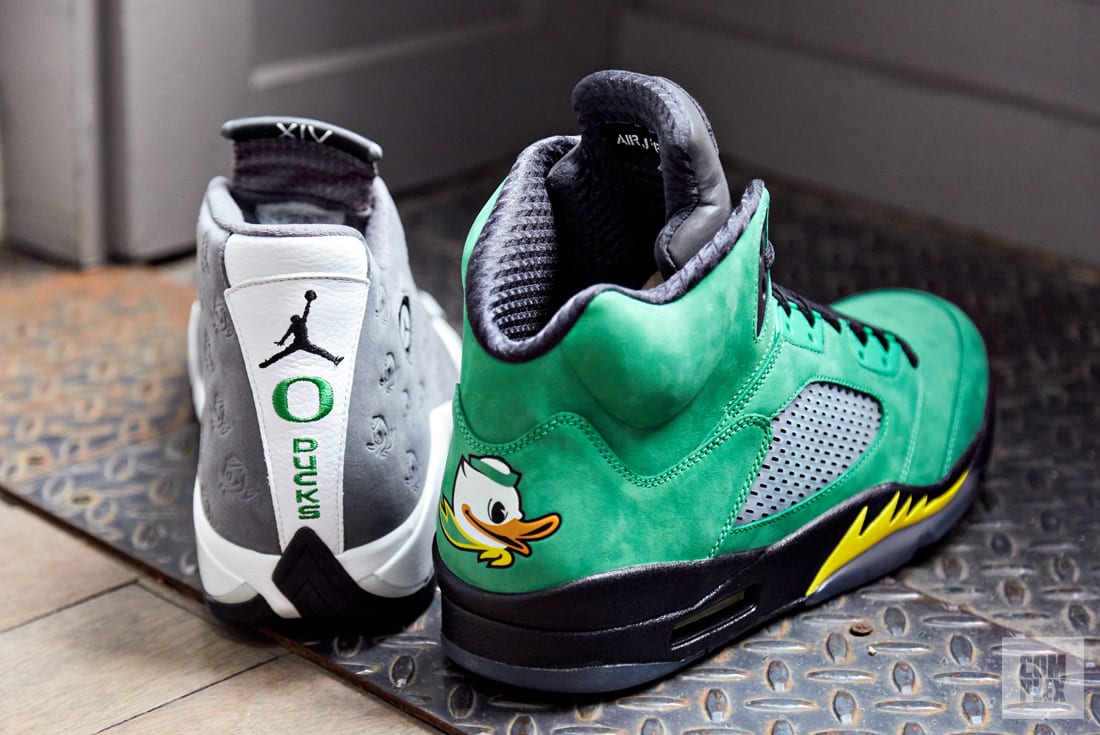
“They warned us that people would definitely be reaching out to us trying to get their hands on a pair and that, if we did sell them, we would be ineligible,” he says.
The players knew they weren’t allowed to sell them, Paysinger says, and didn’t really need to be reminded of the rules. Up until this summer, that was the norm. He didn’t foresee a future in which college players would be able to benefit from the sales of those kinds of exclusive sneakers, although, some did upon exiting the universities that flowed shoes to them.
“Once you graduated, you felt like you were free from those rules,” Paysinger says. “That was a big thing, you knew as soon as you graduated or left the program that you could possibly sell them for anywhere from $2-$6K or so.”
After his time playing for Oregon, the linebacker remained engaged in pursuit of Ducks sneakers. On one visit to his alma mater he had to settle for a pair of “Pit Crew” Air Jordan 3s given to him that were a size too big. Another time, he cold emailed Tinker Hatfield asking for a pair.
“He literally overnighted me a pair of 3s in my size,” Paysinger says.
He remembers being back on campus and seeing a box of Air Jordan 5s made for the Oregon basketball team that the school had taken from players after learning about one member of the team’s plan to sell a pair. Paysinger says that Hatfield mandated the sneakers be returned.
The story is similar to one Hatfield has told about taking back “Pit Crew” Jordans made for members of the student fan squad at Ducks basketball games upon seeing them for sale on eBay. While he’s been protective of the shoes in the past, Hatfield is engaged in helping students get paid for their name, image, and likeness. Aside from being a mainstay at the school’s sporting events, he is a former Oregon athlete who recalls the days of being too broke to go on a date despite being a star on the school’s track and field team.
This summer, Hatifeld created an NFT for Kayvon Thibodeaux, the Ducks’ star defensive end, who then sold it via OpenSea. (Though Hatfield works at Nike, he was careful to explain that Nike was not involved in the project.) In an interview with Complex about the NFT, the designer said that he wasn’t opposed to players selling their sneakers.
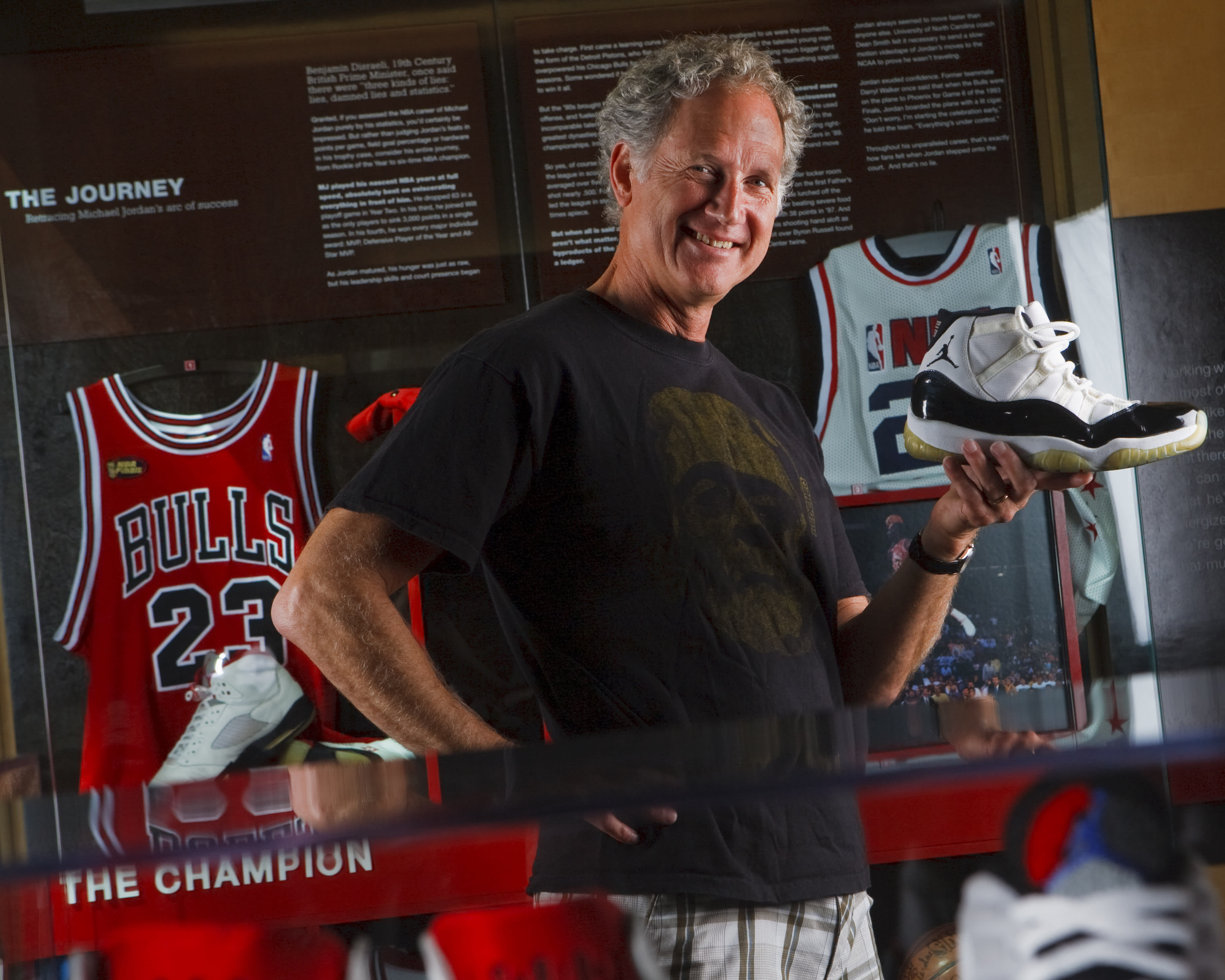
The auction of the Oregon Air Jordan 8s on StockX is representative of the changing moods and rules around college players getting paid for their footwear. Nike is only connected by proxy for now, but it could signal a future in which the brand regularly raises money for players by selling limited edition footwear. This would make the University of Oregon even more alluring for recruits, helping serve the goals of donors like Knight.
It also makes the sneakers less rare for the general public. Shoes that were once given to players and students dedicated to the teams are now being made more readily available to people who are willing to pay the right price. All Oregon versions of Air Jordans will eventually surface on resale platforms, but this approach uses them more explicitly as a tool for profit.
But that’s the point—to open up a new avenue for players to get paid. Paysinger, who put blood, sweat, and tears into the program in order to earn his Oregon Jordans, hasn’t thought much about the shift in their status.
“To me it’s just a natural progression of helping these students out,” he says.

